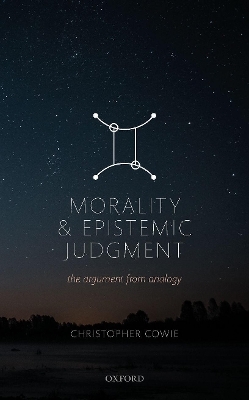
Morality and Epistemic Judgement
The Argument From Analogy
Seiten
2019
Oxford University Press (Verlag)
978-0-19-884273-6 (ISBN)
Oxford University Press (Verlag)
978-0-19-884273-6 (ISBN)
Moral judgments attempt to describe a reality that does not exist, so they are all false. This troubling view is known as the moral error theory. Christopher Cowie defends it against the most compelling counter-argument, the argument from analogy: Cowie shows that moral error theory does not compromise the practice of making epistemic judgments.
Moral judgments attempt to describe a reality that does not exist, so they are all false. This is the moral error theory, a deeply troubling yet plausible view that is now one of the canonical positions in moral philosophy. The most compelling argument against it is the argument from analogy. According to this, the moral error theory should be rejected because it would seriously compromise our practice of making epistemic judgments-judgments about how we ought to form and revise our beliefs in light of our evidence-and could undermine systematic thought and reason themselves. Christopher Cowie provides a novel assessment of the recent attention paid to this topic in moral philosophy and epistemology. He reasons that the argument from analogy fails because moral judgments are unlike judgments about how we ought to form and revise our beliefs in light of our evidence. On that basis, a moral error theory does not compromise the practice of making epistemic judgments. The moral error theory may be true after all, Cowie concludes, and if it is then we will simply have to live with its concerning consequences.
Moral judgments attempt to describe a reality that does not exist, so they are all false. This is the moral error theory, a deeply troubling yet plausible view that is now one of the canonical positions in moral philosophy. The most compelling argument against it is the argument from analogy. According to this, the moral error theory should be rejected because it would seriously compromise our practice of making epistemic judgments-judgments about how we ought to form and revise our beliefs in light of our evidence-and could undermine systematic thought and reason themselves. Christopher Cowie provides a novel assessment of the recent attention paid to this topic in moral philosophy and epistemology. He reasons that the argument from analogy fails because moral judgments are unlike judgments about how we ought to form and revise our beliefs in light of our evidence. On that basis, a moral error theory does not compromise the practice of making epistemic judgments. The moral error theory may be true after all, Cowie concludes, and if it is then we will simply have to live with its concerning consequences.
Christopher Cowie obtained his PhD from the University of Cambridge in 2014. He subsequently worked as a Research Fellow at Fitzwilliam College, Cambridge. Cowie is currently Assistant Professor in Philosophy at the University of Durham.
Introduction
Part I. The Argument From Analogy
1: Moral Error Theory
2: The Analogy
Part II. Against the Analogy
3: Against Internalism-Parity
4: Against Internalism-Parity: A Supplementary Argument
5: Against Irreducibility-Parity
Part III. Elaboration
6: The Conventionalism Criticism
7: Simple Veritism
8: The Normativity of Evidence
Part IV. Fall-Backs and Loose-Ends
9: Error Theory and Thought
10: A Puzzling Combination
11: Conclusion
| Erscheinungsdatum | 19.12.2019 |
|---|---|
| Verlagsort | Oxford |
| Sprache | englisch |
| Maße | 143 x 219 mm |
| Gewicht | 432 g |
| Themenwelt | Geisteswissenschaften ► Philosophie ► Erkenntnistheorie / Wissenschaftstheorie |
| Geisteswissenschaften ► Philosophie ► Ethik | |
| ISBN-10 | 0-19-884273-2 / 0198842732 |
| ISBN-13 | 978-0-19-884273-6 / 9780198842736 |
| Zustand | Neuware |
| Informationen gemäß Produktsicherheitsverordnung (GPSR) | |
| Haben Sie eine Frage zum Produkt? |
Mehr entdecken
aus dem Bereich
aus dem Bereich
die Grundlegung der modernen Philosophie
Buch | Softcover (2023)
C.H.Beck (Verlag)
CHF 25,20
Buch | Softcover (2023)
Reclam, Philipp (Verlag)
CHF 9,80

![Was heißt Denken?. Vorlesung Wintersemester 1951/52. [Was bedeutet das alles?] - Martin Heidegger](/media/113619842)
